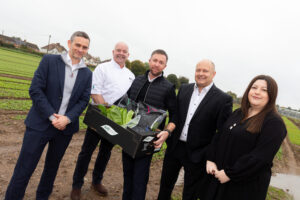ReFood shares top tips to help fight festive food waste

With more than four million tonnes of perfectly edible food wasted in the UK at Christmas, Philip Simpson, commercial director at ReFood, offers his advice to help homeowners leverage their leftovers:
According to research from Cosmopolitan, the average Brit consumes more than 5,000 calories on Christmas Day – more than twice the recommended daily allowance for men and three times for women. But while eating to excess may be a festive tradition, we seem to waste almost as much food as we eat.
Insight from Unilever, for example, calculates that we throw away 74 million mince pies, 14 million plates of turkey, 11 million potatoes, 9 million carrots, 10 million cups of gravy and almost 170 tonnes of sprouts. Collectively, this equates to 30% of Britain’s total annual food waste volume – enough to fill the Great Pyramid of Giza – and 20% of our CO2 emissions!
But, with our national food waste volumes continuing to rise and landfill sites across the country close to capacity, this is a Christmas tradition we can’t afford to keep. To help householders manage their food waste mountains, I’ve written five helpful hints and tips to ensure sustainability is kept front of mind.
1. Plan and prepare to ensure perfect portions
Research from Zero Waste Scotland suggests that most food wasted at Christmas comes from excessive portion sizes and overbuying. To make sure you’re not overloading your plates, check out The Sun’s ‘perfectly balanced Xmas lunch’ guide, which details perfect portion sizes for all your festive favourites.
2. Get creative with your leftovers
If you’re bored of turkey sandwiches, there are countless recipes available to help turn your cold Christmas leftovers into fun festive favourites. Head over to www.lovefoodhatewaste.com for a creative selection of family-friendly meal ideas.
3. Store food correctly
Vegetables, meat and fruit will last longer if stored correctly. What’s more, a significant proportion of your Christmas food shop is perfect for freezing, either before or after cooking, which adds weeks or even months to use-by dates. If you’re unsure about what can and can’t be frozen, or want to know the best storage techniques, visit www.hubbub.org.uk.
4. Streamline your spending
It may seem obvious, but clever planning and preparation can help you to save time, save money and waste less food. From ordering in advance and creating a set menu, to preparing food early and thinking about your leftovers, thinking ahead is key to the perfect Christmas. For a whole host of recipes, guides, hints and tips, visit www.bbcgoodfood.com/feature/christmas-planning.
5. Recycle what you can’t reduce
At ReFood, we recycle unwanted food waste into renewable energy and sustainable bio-fertiliser via anaerobic digestion (AD). If all food waste at Christmas was recycled (rather than binned), we could power an average-sized home for 57 years!
Unfortunately, waste management services across the UK differ from postcode to postcode. As such, only a minority of householders have access to separate food waste collections. If you do have a food caddy, please use it. After all, recycling food waste is a much better solution than sending it to landfill.
This Christmas, why not try something new? Plan your portions, store correctly, get creative with your leftovers, streamline your spending and freeze what’s left. In addition, don’t forget to use your food waste caddy. These steps might sound small, but collectively we can play a part in reducing festive food waste.






